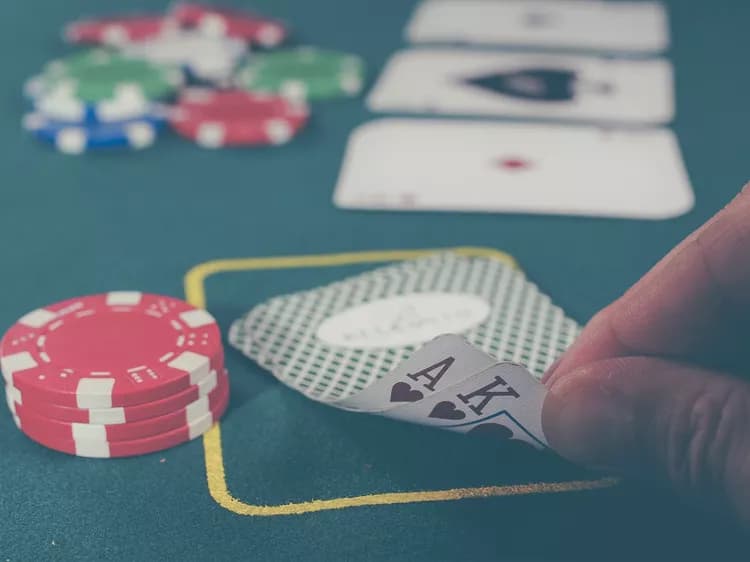
Gambling Addiction Triggers The Same Brain Areas As Drug And Alcohol Cravings
Gambling addiction activates the same brain pathways as drug and alcohol cravings, suggests new research.
The study, by international scientists including researchers from Imperial College London, suggests targeting these brain pathways may lead to future treatments for the condition.
The findings, published in the journal Translational Psychiatry, also suggest connections between the parts of the brain that control our impulses may be weakened in people with gambling addiction.
This work provides vital clues into the biology of gambling addiction, which is still largely unknown, explained Dr Henrietta Bowden-Jones, co-author from the Department of Medicine at Imperial, and director of the National Problem Gambling Clinic, at Central and North West London NHS Foundation Trust.
"Gambling addiction can have a devastating effect not just on patients, but also their families. It can result in people losing their job, and leave families and children homeless.
"We know the condition may have a genetic component -- and that the children of gambling addicts are at higher risk of gambling addiction themselves -- but we still don't know the exact parts of the brain involved. This research identifies key brain areas, and opens avenues for targeted treatments that prevent cravings and relapse."
The study, funded by the UK Medical Research Council, found that two brain areas, called the insula and nucleus accumbens, are highly active when people with gambling addiction experience cravings.
Activity in these areas, which are found deep in the centre of the brain and involved in decision-making, reward and impulse control, has been previously linked to drug and alcohol cravings.
Problem gambling may affect up to 593,000 people in the UK. The condition can be treated by talking therapies, such as cognitive behavioural therapy, or medications that combat cravings.
In the research, which was conducted between Imperial and the National Problem Gambling Clinic, scientists studied 19 patients with gambling addiction, and 19 healthy volunteers.
The most commonly reported problematic forms of gambling among the patients were electronic roulette and sports gambling.
Each volunteer went into a magnetic resonance imaging scanner -- which uses a powerful electromagnet to monitor brain activity -- and were shown various images. These included pictures of gambling scenes, such as a roulette wheel or a betting shop.
All participants were asked to rate their level of craving when they saw the images.
The team, which included scientists from the University of British Columbia and the University of Cambridge, then assessed which brain areas were activated when the volunteers experienced cravings.
They found that, in problem gamblers, the insula and nucleus accumbens were highly active when they were shown an image associated with gambling, and experienced a craving.
Interestingly, the team also found that weaker connections between the nucleus accumbens and an area called the frontal lobe in problem gamblers were associated with greater craving.
The frontal lobe, which is involved in decision-making, may help keep the insula in-check by controlling impulses, explained Professor Anne Lingford-Hughes, co-author from the Department of Medicine at Imperial.
"Weak connections between these regions have also been identified in drug addiction. The frontal lobe can help control impulsivity, therefore a weak link may contribute to people being unable to stop gambling, and ignoring the negative consequences of their actions. The connections may also be affected by mood -- and be further weakened by stress, which may be why gambling addicts relapse during difficult periods in their life."
Professor Lingford-Hughes added that monitoring activity and connections in the insula and nucleus accumbens in gambling addicts may not only help medics assess effectiveness of a treatment, but may also help prevent relapse -- a common problem in addiction.
The group are now investigating which treatments may reduce activity in these areas, in an attempt to reduce cravings.
They would also like to compare the brain activity of problem gamblers with people who gamble but do not have an addiction, to investigate why the addiction escalates in some but not others.
Materials provided by Imperial College London. Original written by Kate Wighton. Note: Content may be edited for style and length.
Disclaimer: DoveMed is not responsible for the accuracy of the adapted version of news releases posted to DoveMed by contributing universities and institutions.
Primary Resource:
Limbrick-Oldfield, E. H., Mick, I., Cocks, R. E., McGonigle, J., Sharman, S. P., Goldstone, A. P., ... & Nutt, D. (2017). Neural substrates of cue reactivity and craving in gambling disorder. Translational Psychiatry, 7(1), e992. DOI: 10.1038/tp.2016.256
Related Articles
Test Your Knowledge
Asked by users
Related Centers
Related Specialties
Related Physicians
Related Procedures
Related Resources
Join DoveHubs
and connect with fellow professionals

0 Comments
Please log in to post a comment.